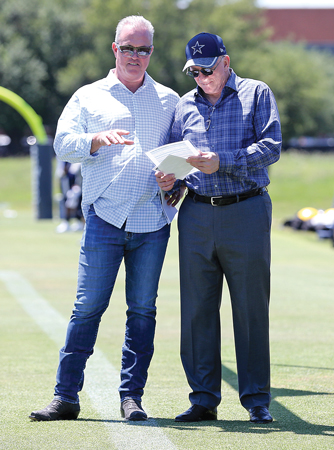The NFL is tapping the brakes on big data, limiting how much of a newly available set of statistical information will be available to teams leaguewide this season.
Specifically, the league will not allow teams to access other clubs’ player-tracking data, and the move underscores how the NFL wants to ensure the data does not create an uneven playing field as some teams become better equipped to process the figures.
In this case, the data comes from tracking player movements through radio tags in the players’ shoulder pads that it began capturing in 2014.
 |
Dallas’ Stephen Jones (here with Jerry Jones) touted broad release of the data.
Photo by: AP IMAGES |
“There were coaches that just felt that they didn’t want people having data on their individual team, whether it be for free agency or game planning, whatever it may be,” said Stephen Jones, the Dallas Cowboys’ executive vice president, COO and director of player personnel and who advocated for full distribution of the data from his position on the league’s competition committee. “I can see where maybe people see ghosts and [say] ‘Are we staffed up enough as the next guy?’ There is always the question of the arms race and the resources to actually make heads or tails of the data. There are things that people get nervous about.”
Across the NFL, there are teams considered to be more all-in on data and metrics than other clubs. In addition to Jones’ Cowboys wanting to work with a full slate of data, the New England Patriots are seen as out front with their data work. San Francisco, particularly with new coach Chip Kelly, is another franchise touted in this regard.
Atlanta Falcons President and CEO Rich McKay, co-chairman of the competition committee, said, “The committee … needed a better understanding of what data was being collected and how it will be used as part of their analysis of potential competitive impact going forward.”
The NFL in 2014 hired Zebra Technologies to track players by placing radio frequency identification chips on them. That year, only half the stadiums across the league were equipped to collect the data, dubbed “next-generation stats,” and the league did not distribute the captured data. All stadiums were equipped last season, but McKay’s committee ruled in May this year that each team could get access only to its own 2015 data — as well as its new numbers, for the coming season — ruling against those like Jones who wanted full distribution.
The data can produce a seemingly infinite amount of information, from acceleration speeds to how quickly a wide receiver can separate from a defender.
The day after games this coming season, each team will be able to access the next-generation stats — but the numbers will have only the data for that franchise’s own players, not for the opposing team’s players. The league will make available raw tracking data, summary level data the league has calculated using the raw data, and a secure web site that allows teams to interface with the data for compilation and analysis. Clubs are allowed to engage third parties to help them analyze the data, providing those retained companies sign strict confidentiality forms.
There is a growing sensitivity to player tracking data, especially around data ownership and privacy information and what should be shared with players, teams, fans and media. Such issues are expected to be addressed during the next round of collective bargaining. Among other leagues, the NBA and MLB have optical systems in place for tracking players, but the competitive balance discussions being had in the NFL and the use of data by all teams are unique to football at this point.
Off the field, the NFL has other uses for this type of data. TV broadcasters can use it to analyze plays, and the league’s consumer data partner, Sportradar, has rights to distribute the numbers along with more traditional statistics. The competition committee ruling does not affect those uses.
“This database can be mined for all kinds of information with limitless applications for coaching, training and scouting. Using this data, predictive analytics will change how on-field decisions are made,” said Tom Spock, founding partner with Scalar Media, which advised Zebra on the NFL deal. “So if the leagues are taking their time deciding who has access to this data, and under what conditions, it’s no wonder.”
But Jones questions what the purpose of having all the data is if it’s not all getting sent to the teams.
“When getting into something like next-generation stats, to really make something of it, you need a bigger subset of information and data,” he said.




